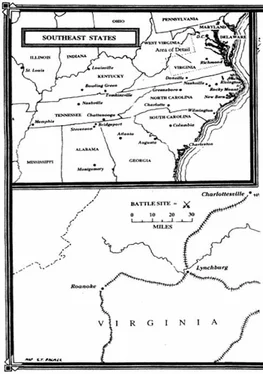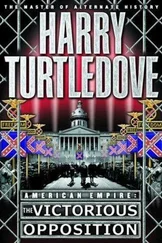Harry Turtledove - The Guns of the South
Здесь есть возможность читать онлайн «Harry Turtledove - The Guns of the South» весь текст электронной книги совершенно бесплатно (целиком полную версию без сокращений). В некоторых случаях можно слушать аудио, скачать через торрент в формате fb2 и присутствует краткое содержание. Год выпуска: 1992, ISBN: 1992, Издательство: Ballantine, Жанр: Альтернативная история, на английском языке. Описание произведения, (предисловие) а так же отзывы посетителей доступны на портале библиотеки ЛибКат.
- Название:The Guns of the South
- Автор:
- Издательство:Ballantine
- Жанр:
- Год:1992
- ISBN:0-345-38468-7
- Рейтинг книги:4 / 5. Голосов: 1
-
Избранное:Добавить в избранное
- Отзывы:
-
Ваша оценка:
- 80
- 1
- 2
- 3
- 4
- 5
The Guns of the South: краткое содержание, описание и аннотация
Предлагаем к чтению аннотацию, описание, краткое содержание или предисловие (зависит от того, что написал сам автор книги «The Guns of the South»). Если вы не нашли необходимую информацию о книге — напишите в комментариях, мы постараемся отыскать её.
The Guns of the South — читать онлайн бесплатно полную книгу (весь текст) целиком
Ниже представлен текст книги, разбитый по страницам. Система сохранения места последней прочитанной страницы, позволяет с удобством читать онлайн бесплатно книгу «The Guns of the South», без необходимости каждый раз заново искать на чём Вы остановились. Поставьте закладку, и сможете в любой момент перейти на страницу, на которой закончили чтение.
Интервал:
Закладка:
They lay there panting for a few seconds, then got to their feet—they still stooped, for the roof was too low to offer much cover—and sidled around toward the front of the cabin. They almost ran into a tall, skinny Negro man hurrying the other way—and almost killed him, too, for Caudell’s heart leaped into his mouth and his finger tightened on the trigger of his rifle. By Mollie’s gasp, the unexpected meeting frightened her just as badly.
If they were frightened, the slave was terrified. He jumped backwards, screaming like a woman, and threw his hands high over his head. “Don’ shoot me!” he squealed. “Don’ shoot poor ol’ raggedy Shadrach who ain’t done you no harm!” Then he seemed to see the uniforms Caudell and Mollie were wearing, instead of merely the AK-47s they carried. His eyes widened till they looked like splashes of whitewash on his black face. “Lawd God,” he said, “you ain’t them devils what owns us? You gummint sojers?”
“That’s right,” Caudell said, thinking that raggedy was a word that fit Shadrach like a second skin. Plenty of his first skin was plain to see, for his gray cotton jacket and trousers were little more than rags. By the ladder of ribs thus exposed, Caudell guessed he was fed no better than he was clothed.
Now his eyes got wider still; Caudell hadn’t thought they could. “Gummint sojers,” the Negro repeated wonderingly. He capered like a stick puppet, then leaped forward to fold Caudell and Mollie into a bony, rank embrace. “I’s powerful glad to see you gentlemens, ‘deed I is. You kill every one o’ them devils in green, you hear me? Kill ‘em daid! Every Rivington nigger there is ‘ll bless you fo’ it.”
Caudell blinked; he was not used to this kind of ecstatic greeting from a slave. During the Second American Revolution, Negroes had run away from Confederate armies, not toward them. He wondered again what sort of horrors the Rivington men worked on their blacks, though Shadrach’s condition gave him a clue. But that, for the moment, was by the way. He pointed toward the big house. “Any Rivington men holed up in there?”
“No, suh,” Shadrach said positively. “The massa, he off fightin’ ‘gainst you folks. Couple other devils run by here a while back”—he gestured vaguely—”but they don’ stop. You hunt ‘em down, suh, hunt ‘em down if’n you has to use dogs. Every nigger here, he never complain about nothin’ no mo’, not if’n you gets ‘em all. You give us guns, we shoots ‘em our own selves.”
“I believe you,” Caudell said. He did, too, where before the war he would have laughed at the idea that Negroes might make soldiers (before the war, of course, no Negro would have been so suicidally foolhardy as to ask one white man for arms to use against another).
“Marse Robert, he gwine set the niggers free like we hear tell?” Shadrach asked.
“A little at a time, yes,” Caudell said, which was plenty to set the slave dancing again.
“If that house is empty, we got to get going,” Mollie said. Caudell nodded. He glanced back as he trotted away. Shadrach was still capering beside the mean little slave cabins. A couple of women, gaudy in brightly striped skirts and wearing red handkerchiefs on their heads, stepped out of their huts. Shadrach pointed at Caudell and Mollie, said something. The women screeched for joy and started dancing, too. One of them was big with child. Hurrying past the big house, Caudell wondered who had put that child in her.
A few hundreds yards past the clearing, fighting picked up. The coughing snarl of an endless repeater brought Caudell to a respectful halt. Off to the right, he heard Nathan Bedford Forrest yelling, “I see the dirty son of a bitch! We’ll git him—he ain’t dug his self in yet.”
Sure enough, after a minute or so the Rivington repeater fell silent and rebel yells rang out in triumph. Caudell and Mollie moved forward again, past the dead gunner. He had sited his weapon well—say what you would of them, the Rivington men were no mean soldiers—but in this chaotic fighting had lacked time to use the spade. Now he also lacked most of his face.
Mollie and Caudell came up to another palatial mansion, this one also flanked by slave huts all the shabbier in comparison to the big house. Mollie frowned; after some little hesitation, she said, “That there’s Benny Lang’s place.”
“Is it?” Caudell’s voice was as neutral as he could make it. He paused for thought, finally found something safe to add: “He never seemed to notice his book was missing.”
“You’re right,” Mollie said. “Reckon with the war over and all, he didn’t need to read about it no more.” Caudell chewed on that a few seconds before he nodded. As Lang himself had said, everything—the war included—went the Rivington men’s way until Lee became President of the Confederacy. And when things went badly afterwards…”I think you put all this in train when you took that book.”
“Wasn’t all me, Nate Caudell,” she said, sounding almost angry. “You reckon I’d’ve ever thought of anything as crazy as goin’ up to Marse Robert by my lonesome? Not likely!”
“Maybe not,” he admitted. “I won’t lose sleep over my part, though. The way I look at it is like this: If the Rivington men are the sort of people who could do something like the Richmond Massacre, they aren’t the sort of people who ought to be near the top of the heap. They would have done something else just as bad sooner or later, with us or without us. They need putting down, and we’re just the ones who happen to be doing the job.”
“Might could be you’re right,” Mollie said thoughtfully, and, after a moment, “Reckon maybe you are. You got a good way of lookin’ at things, Nate.”
“Most important thing I want to look at now is the both of us getting through this alive…intended.” The way Mollie’s face kindled made Caudell glad he’d tacked on the last word.
They went by or near several more big new houses; the Rivington men had built far back into the woods from what once was the sleepy little town of Rivington. About a mile and a half from the western edge of what had been the town, the Rivington men made a serious stand. “You want to watch yourself,” a corporal warned as Caudell came up. “They got wire with teeth strung out up ahead. You try crawlin’ through it, it slows you down an’ they shoot you.” Bodies hung up at grotesque angles underscored the fellow’s caution.
From behind the wire, the Rivington men traded fire with the Confederates. Nathan Bedford Forrest stalked down the stalled Confederate line. His dark gray eyes flashed with frustration. “We got to keep drivin’. They get a chance to dig in here, we have to start allover again, Goddamn it.” Suddenly he pounded fist into open palm, laughed out loud. Turning to an aide who walked beside him, he said, “Major Strange, I reckon it’s about time to send in a flag of truce.”
Major J. P. Strange, Forrest’s adjutant, was a dark-haired man of about the general’s age, with a high, broad forehead, sweeping mustaches, and a graying beavertail of a beard. He said, “The usual message, sir? They’d best surrender, or we shan’t answer for the consequences?”
“The very same.” Forrest chuckled reminiscently. “Don’t know how many times we slickered the Yankees with that one during the war. ‘Course, after Fort Pillow they was more inclined to believe it than they had been before.”
“Let me scout out some white cloth and a stick, sir,” Strange said.
A few minutes later, he stepped out between the two lines waving the parley flag. Firing slowed, stopped. A Rivington man called, “Come ahead and say your say, graycoat. We won’t shoot for—say, an hour?”
Strange looked back at Forrest, who nodded. “Agreed,” the major said. Holding the white flag high, he walked forward. A Rivington man, almost invisible in his mottled clothes and what looked like green and brown face paint, took charge of him.
Читать дальшеИнтервал:
Закладка:
Похожие книги на «The Guns of the South»
Представляем Вашему вниманию похожие книги на «The Guns of the South» списком для выбора. Мы отобрали схожую по названию и смыслу литературу в надежде предоставить читателям больше вариантов отыскать новые, интересные, ещё непрочитанные произведения.
Обсуждение, отзывы о книге «The Guns of the South» и просто собственные мнения читателей. Оставьте ваши комментарии, напишите, что Вы думаете о произведении, его смысле или главных героях. Укажите что конкретно понравилось, а что нет, и почему Вы так считаете.












